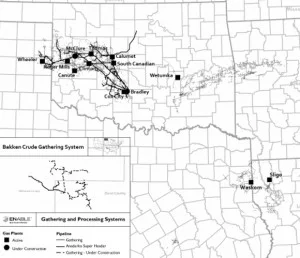Enable Midstream Partners announced last week that it has completed its first crude oil and produced water gathering system in North Dakota.
The project began in August of 2013 to service XTO Energy Inc, a major Bakken producer. The Bear Den Crude & Produced Water Gathering System system is located in Dunn Co, N.D. and now that it is fully operational, will a maximum throughput of 19,500 barrels of oil per day.
Related: News & discussion with mineral owners in Dunn Co, N.D.
“Lynn Bourdon, president and CEO of Enable Midstream said, “It’s a great demonstration of our ability to effectively and efficiently deploy expansion capital to meet our customers’ needs for delivering energy to key markets.”
In the oil and gas industry, a gathering system includes both the flowline networks and the process facilities. It is through this system that oil and/or gas is transported and controlled from the well site to a main storage facility, processing plant, or shipping point.
Enable Midstream serves major markets by developing and operating natural gas and crude oil infrastructure. The company’s operations include:
- 11,000 miles of gathering pipelines
- 12 processing plants that process ~2.1 billion cubic feet per day
- ~ 7,900 miles of interstate pipelines with 8.4 billion cubic feet per day of transport capacity
- ~ 86.5 billion cubic feet of natural gas storage capacity
- ~ 2300 intrastate pipelines
Read ore at enablemidstream.com





